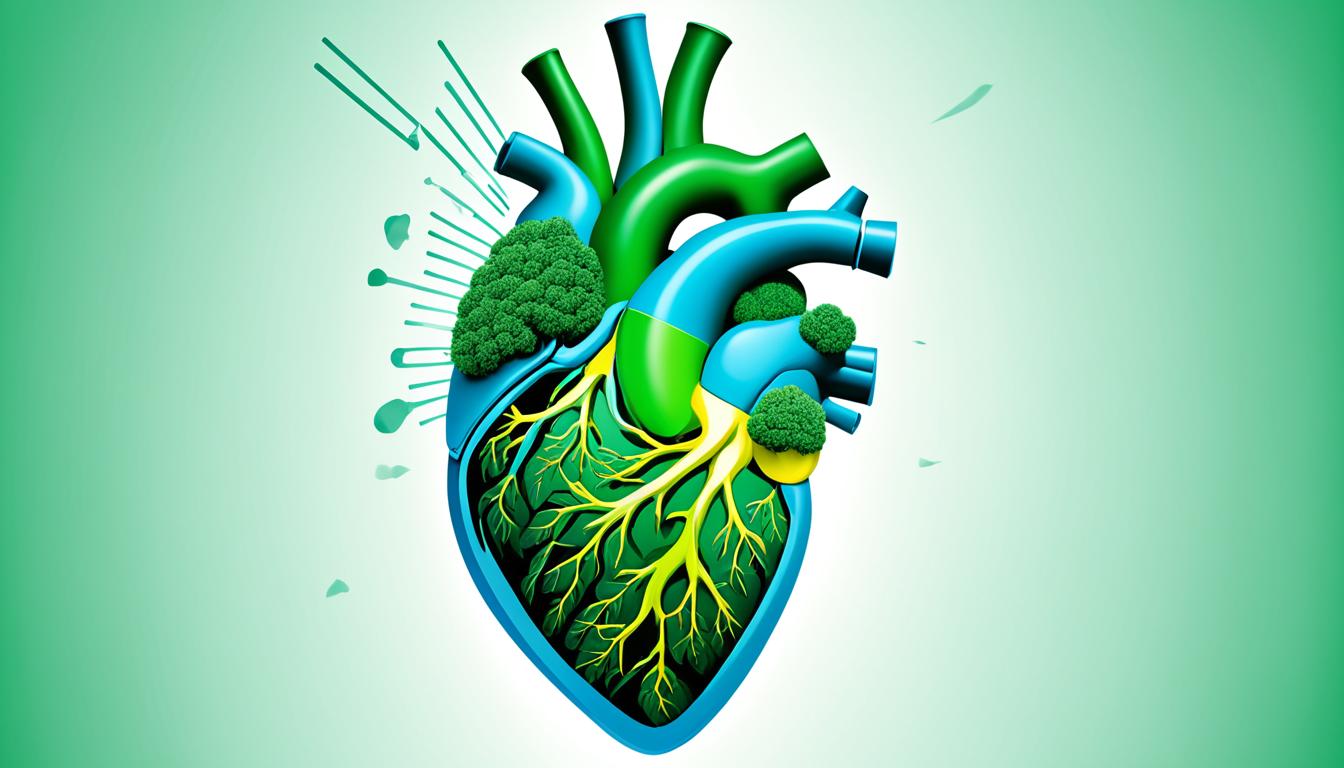Omega-3 fatty acids are vital for our health. They support every cell in our body, including eye and brain cells. These fatty acids are key parts of our cell membranes.
Omega-3s offer many health advantages. For your heart, they lower harmful triglycerides while increasing good HDL cholesterol. They also help keep blood pressure in check.
These fatty acids lower the risk of heart disease and stroke. They also boost brain health, contributing to better memory and possibly guarding against macular degeneration as we age. Plus, they’re crucial for building a baby’s brain.
Omega-3s might make you feel happier and calmer. They could ease depression and anxiety symptoms, and might even help with ADHD.
Key Takeaways:
- Omega-3 fatty acids support cell function and provide structure to cell membranes.
- They can benefit heart health by lowering triglyceride levels and raising HDL cholesterol.
- Omega-3s may reduce the risk of cardiovascular disease and improve brain health.
- They have the potential to lower the risk of age-related macular degeneration and aid in infant brain development.
- Omega-3s may help reduce symptoms of depression, anxiety, and ADHD.
What are Omega-3 Fatty Acids and Fatty Acids Explained?
Omega-3 fatty acids are important for our health. We can’t make these fats in our bodies, so we get them from food. They are better for us than some other fats. Omega-3s help our cells work right and keep our body systems healthy.
Now, let’s look at all fatty acids. They are long atoms made up of carbon, oxygen, and hydrogen. Fatty acids have parts that other atoms can connect to. For example, saturated fats are all taken, but omega-3s have lots of room for more.
Eating omega-3 fatty acids makes us healthier. They do a lot for us. Omega-3 helps our heart, brain, and more. Adding them to what we eat keeps us in good shape.

Want to eat more omega-3? Good news, there are many kinds of food to try. Things like salmon, chia seeds, and walnuts have lots of omega-3s. Mix them up to get all the benefits.
What do Omega-3 Fatty Acids Do?
Omega-3 fatty acids are crucial for our bodies. They help with our cells’ structure, vitality, and efficiency. This support goes beyond cells. It also boosts our heart, blood vessels, and hormone balance.
Our heart needs omega-3s to stay healthy. They help lower harmful fats and increase good cholesterol. They also keep our blood pressure in check, reducing heart disease risks.
Omega-3s impact our hormones and body balance too. They aid in hormone production. This keeps our glands and organs working well. So, they boost our all-around health.
These fatty acids are key for our eyes and brain too. They help maintain our eyesight, protecting against eye issues. And for the brain, they help with thinking and mood, possibly lessening conditions like depression and ADHD.
So, omega-3s are vital for many aspects of our health. Next, we’ll look at the various types and what they do.

Types of Omega-3 Fatty Acids

Omega-3 fatty acids aren’t all the same. Each type has its benefits. There are three main kinds: EPA, DHA, and ALA.
EPA
EPA is in fatty fish like salmon and tuna. It’s great for your heart and fights inflammation.
DHA
DHA is found in fish, especially in salmon and sardines. It helps with brain health and growth, especially in kids.
ALA
ALA comes from plants like flaxseeds and walnuts. Your body changes it into EPA and DHA, but not too much. So, you still need to eat fish for these nutrients.
“Including a variety of omega-3 sources in your diet is key to reaping the full benefits of these essential fatty acids.”
Eating fish and plants gives you lots of omega-3 goodness. Fish has EPA and DHA, while plants have ALA. It’s important to get both.
| Type of Omega-3 Fatty Acid | Food Sources |
|---|---|
| EPA | Fatty fish (salmon, mackerel, tuna) |
| DHA | Fatty fish (salmon, sardines) |
| ALA | Flaxseeds, chia seeds, walnuts, oils |
Fish is great for EPA and DHA. But, if you don’t eat fish, plants can still help with ALA.
Eating a mix of fish and plant-based foods ensures you get enough omega-3s. This is good for your health.
Benefits of Omega-3 Fatty Acids for Cardiovascular Health
Omega-3 fatty acids can make your heart stronger. They help lower the risk of heart diseases and strokes. Adding omega-3s to your diet can be really good for your heart.
Lower Triglyceride Levels
High triglycerides can make you more likely to get heart disease. Omega-3s can lower these levels, which is good for your heart.
Raise HDL Cholesterol
Omega-3s work to increase HDL cholesterol. This is good because it helps your body get rid of bad cholesterol better. This in turn, protects your heart from diseases.
Lower Blood Pressure
High blood pressure can lead to heart disease and stroke. Omega-3s can help lower blood pressure. This reduces stress on your heart.
Reduced Risk of Cardiovascular Disease
Omega-3s are good for your heart in many ways. They work on your triglyceride levels, HDL cholesterol, and blood pressure. This all adds up to less risk of heart problems.
Prevention of Blood Clots and Abnormal Heart Rhythm
There’s new evidence that omega-3s also prevent blood clots and problems with your heart rhythm. This means less chance of a stroke or sudden death from heart issues.
To get enough omega-3s, eat fish like salmon or take supplements. But, always talk to your doctor first. They can tell you what’s best for your health.

| Benefits of Omega-3 Fatty Acids for Cardiovascular Health |
|---|
| Lower Triglyceride Levels |
| Raise HDL Cholesterol |
| Lower Blood Pressure |
| Reduced Risk of Cardiovascular Disease |
| Prevention of Blood Clots and Abnormal Heart Rhythm |
Other Potential Benefits of Omega-3 Fatty Acids
Omega-3 fatty acids are great for the heart, but they do more. Studies show they could boost your health in many ways. These nutrients might help you feel better overall.
Age-Related Macular Degeneration
Omega-3s might reduce the chance of losing vision as you age. They keep the eyes healthy, lowering the risk of age-related vision loss.
Infant Brain Development
Moms and little ones need Omega-3s for a healthy brain.
They are key for brain growth and learning in babies.
Depression, Anxiety, and ADHD
Omega-3s could help with mental health issues like depression, anxiety, and ADHD. There is growing evidence that they lessen symptoms and boost wellness.
Research is still ongoing, and we need more to be sure of the benefits. Use Omega-3s together with medical advice and lifestyle changes for best results.
Omega-3 Fatty Acids in Food Sources
Fish and plants are great for getting omega-3 fatty acids. These fats are key for health. Cold-water fish like salmon, mackerel, and sardines are the richest sources. They contain EPA and DHA, vital for the body.
Plants also offer omega-3s. You can add flaxseed, chia seeds, walnuts, and oils like flaxseed and soybean to your meals. They are rich in ALA, another form of omega-3.
“Including a variety of fish and plant-based sources of omega-3 fatty acids in your diet can provide the essential nutrients your body needs for optimal health.”
When eating fish, watch out for mercury, especially if you’re pregnant or feeding young kids. Go for low-mercury choices like wild salmon or trout to stay safe.
Tap the table below to see which fish have less mercury:
| Low-Mercury Fish | High-Mercury Fish |
|---|---|
| Sardines | Swordfish |
| Trout | Shark |
| Salmon | Tilefish |
| Mackerel | King Mackerel |
Diversifying your diet with different fish and plants is very beneficial. Ensure you’re choosing fish with low mercury.
Concerns and Considerations with Omega-3 Supplements
Omega-3 supplements, like fish oil pills, are popular for their health benefits. But, it’s key to be careful. Always talk with a healthcare provider before starting them. Supplements can affect prescription drugs and might not help the heart as much as you think. Keep updated on the newest research and follow dietary advice.
Any supplement, including omega-3s, might not mix well with all medicines. Tell your doctor about any supplements to check for issues and see if they’re right for you.
Many people can take omega-3s without problems. Still, watch out for side effects like bad breath, nausea, and stomach problems. These issues tend to be minor and don’t last long. If they persist or get worse, it’s smart to get advice from a doctor.
“Before starting any supplementation, it is always best to consult with your healthcare provider to assess your individual needs and determine the appropriate dosage and duration of use.” – Dr. Jane Smith, Nutrition Specialist
Research on omega-3 benefits is always evolving. Stay in the loop with trustworthy sources for the latest health advice. This way, you can decide what’s best for you.
Whole foods are the best way to get your daily nutrients, including omega-3s. A mix of fish, veggies, and grains is your best bet. This diet is better than relying only on supplements.
The Role of Dosage in Omega-3 Supplements
Finding the right omega-3 dose is important. It depends on many things, like your health, age, and sex.
Here’s a rough guide on how much to take:
| Omega-3 Source | Recommended Dosage |
|---|---|
| Fish Oil | 1,000-2,000 mg per day |
| Algal Oil (for vegetarian/vegan individuals) | 200-300 mg DHA per day |
But these are just starting points. Your personal dose might need tweaking, depending on your health. Always ask a healthcare expert for advice.
With the right information and the help of a healthcare provider, using omega-3 supplements wisely can benefit your health. Stay informed to make the best choices.
Recommended Intakes and Assessing Omega-3 Status
The Institute of Medicine (IOM) set how much omega-3 we need by age and gender. These levels help us know the right amount for good health. The levels include the Recommended Dietary Allowance (RDA), Adequate Intake (AI), Estimated Average Requirement (EAR), and Tolerable Upper Intake Level (UL).
The RDA shows how much of a nutrient is needed daily for most people’s health. For omega-3 fatty acids, the RDA changes with the kind of omega-3 and your age.
If there isn’t enough proof for an RDA, they find an AI instead. This AI gives the best guess at how much omega-3 is needed. Like the RDA, the AI amount varies by omega-3 type and age.
The EAR aims to meet the needs of half the healthy people in a certain group. It’s based on research and studies of the general population.
The UL marks the top safe amount of a nutrient per day. For omega-3 fatty acids, this stops us from taking too much.
Knowing how much omega-3 to take is one part. We also need to check if we’re getting enough. Tests like those for phospholipid levels can tell if we have the right amount in our bodies.
But, we don’t yet have set normal levels for these tests. Talk to a doctor to understand the results and what they mean for your health.
Sources of Omega-3 Fatty Acids
Getting enough omega-3 in your diet is key to being healthy. Luckily, many foods are great sources of these fats. This means you can easily meet your omega-3 needs naturally.
Stuff like flaxseed, soybean, and canola oils are full of ALA, an omega-3. You can use these oils in cooking and salad dressings. They offer a plant-based way to get your omega-3s.
Fatty fish like salmon, mackerel, and sardines have EPA and DHA, other omega-3s. These fish are really good for you. Eating them often helps make sure you get enough EPA and DHA.
Don’t like fish? No problem. You can find omega-3s in other foods. For example, grass-fed beef has more omega-3s than grain-fed beef. It’s a better choice for getting these healthy fats.
Some foods are even boosted with omega-3s. Eggs, yogurt, and milk often have extra omega-3s. So do juices and soy drinks. This makes it easier to up your omega-3 intake.
By mixing up where you get your omega-3s, you keep your diet interesting. This mix ensures your body gets the omega-3s it needs. So, pick your favorites from fish, oils, fortified foods, and grass-fed beef. Adding omega-3 fatty acids to your meals is good for your wellness.
Conclusion
Omega-3 fatty acids are really good for you. They help your heart, mind, and body stay healthy. You can get enough by eating the right foods. Things like fatty fish (salmon, tuna), flaxseeds, and walnuts are great. Also, you can find omega-3s in some dairy and plant-based foods.
Eating foods rich in omega-3s is the best way to go. But, talking to a doctor before taking supplements is smart. It keeps you up-to-date and safe. Whether in food or supplements, adding omega-3s to your diet is a smart move for health and happiness.
Don’t forget to eat a mix of foods for all the nutrients your body needs. Omega-3s are vital for good health. So, make sure to add them to your meals every day. This way, your health and energy will soar.
FAQ
What are the benefits of omega-3 fatty acids?
Omega-3 fatty acids can improve our heart and brain health. They boost our overall health by supporting our body’s functions.
What are omega-3 fatty acids and fatty acids explained?
Omega-3 fatty acids are important fats our body needs. They help with cell structure and function. Different fats, like saturated and monounsaturated, vary in their structure.
What do omega-3 fatty acids do?
They are key for cell function and building cell walls. Omega-3s are also important for energy and keeping our heart and hormone systems healthy.
What are the types of omega-3 fatty acids?
EPA, DHA, and ALA are the three main omega-3 fatty acids. Fish provide EPA and DHA, while ALA comes from plants.
What are the benefits of omega-3 fatty acids for cardiovascular health?
For our heart, omega-3 fatty acids do a lot of good. They can lower our bad cholesterol and blood pressure. This can mean less chance of heart disease and stroke.
What are the other potential benefits of omega-3 fatty acids?
Other than heart health, omega-3s can help with many things. They might keep our eyes and minds sharp as we age. For babies, they support brain growth. They may even lessen feelings of depression, anxiety, and ADHD.
What are the food sources of omega-3 fatty acids?
Fish, like salmon, tuna, and sardines, are rich in omega-3s. For those who don’t eat fish, flaxseed, chia seeds, and walnuts are good options. Some plant oils and certain oils are good sources too.
Should I be concerned about omega-3 supplements?
Omega-3 supplements can help some people, but it’s best to check with a doctor first. They might not mix well with all medicines and could have side effects. The benefits to heart health are still being studied.
How do I assess my omega-3 status?
Doctors look at blood levels of omega-3 to check your status. However, we don’t yet have a set ‘normal’ for what these levels should be.
What are the sources of omega-3 fatty acids?
We can get omega-3s from various foods. Fish, plant oils, and even grass-fed beef are good sources. Plus, some foods are fortified with omega-3, like eggs and milk.
How can omega-3 fatty acids benefit my health?
Getting enough omega-3s is really good for your heart, brain, and well-being. You should try to include them in your diet. Sometimes, taking supplements can also help, especially if recommended by your doctor.


















